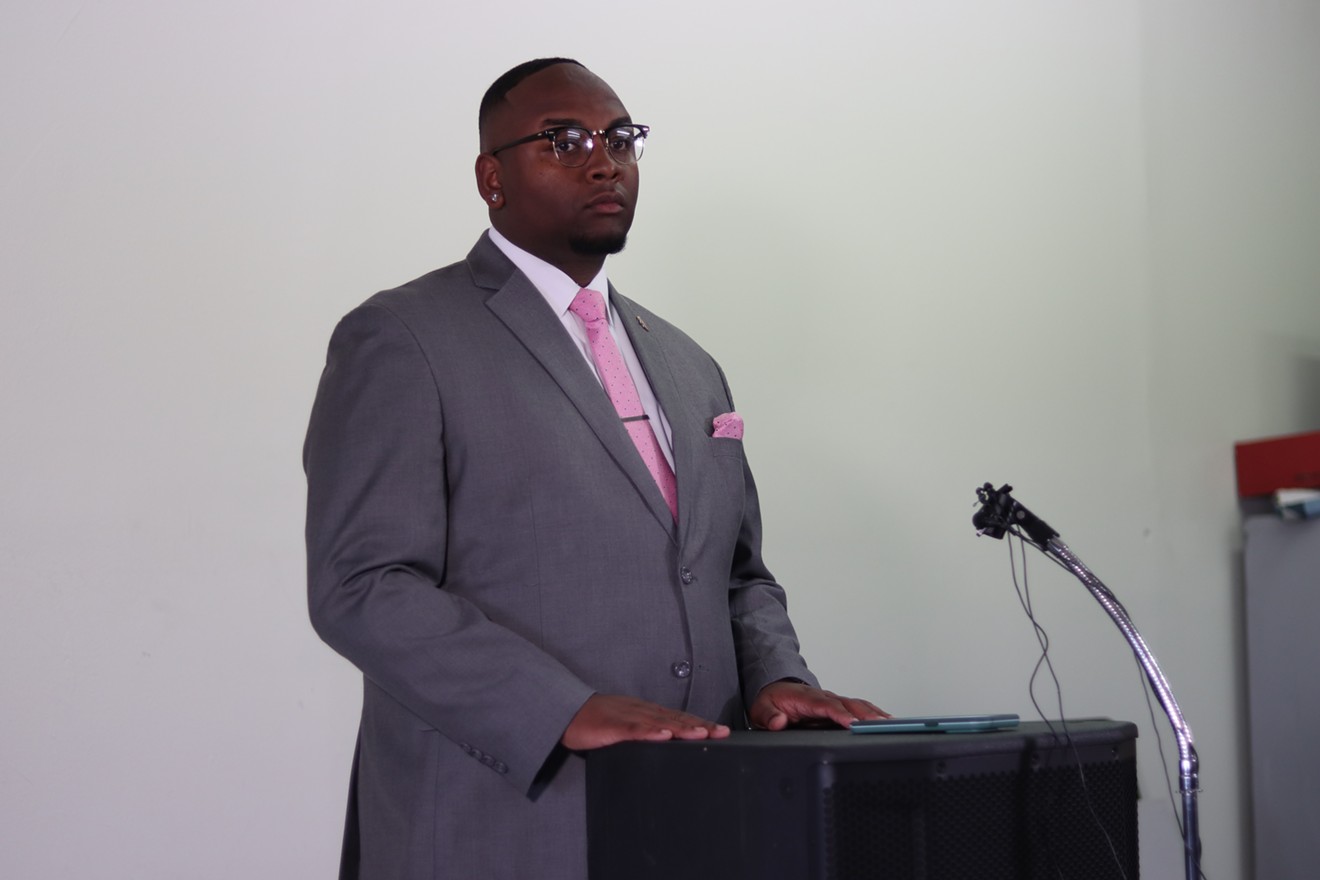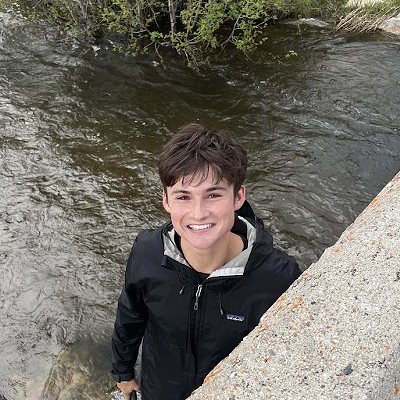With one week to go before school resource officers are back in Denver Public Schools, the school board and the city remain unclear — and uncoordinated — regarding how the decision to bring back SROs was made and the logistics of how the move will be made.
As school board officials and the mayor's office went back and forth publicly on what prompted the return of the SROs, which were banned from city high schools in June 2020, the Denver Police Department tells Westword that it plans to "absorb" the cost.
Early on March 27, DPS School Board Vice President Auon'tai Anderson held a press conference — without participation from other members of the board — at Brother Jeff's Cultural Center to discuss the board's decision to support the reinstatement of SROs and hurl some serious accusations at Mayor Michael Hancock.
Anderson claimed that Superintendent Dr. Alex Marrero and the mayor ultimately forced the board's hand in bringing back the armed officers after the March 22 shootings at East High School. "The superintendent approached me and the board president, let me know — let us know — that this was a decision that would happen without the board's approval," he said.
According to Anderson, Marrero met with the board before its closed-door executive session on March 23 to say that "the mayor of Denver had an executive order ready to be drafted to declare a public health emergency, just like he did with vaccinations, to deploy school resource officers back to schools."
Anderson said the board's decision to reintroduce SROs was made both in response to the East High shooting and with the intent of "preserving the institution of the school board." It was necessary, he added, because "unfortunately, the mayor tried to interfere with school board policy."
Mike Strott, director of communications for the mayor's office, says there is "no truth" to Anderson's claim.
"The decision to return SROs to high schools was Superintendent Marrero’s decision alone, which the mayor encouraged and supports, because it’s the right decision," Strott says.
Following Anderson's press conference, school board president Xóchitl Gaytán sent a release distancing the board as a whole from Anderson. "Individual directors of the DPS Board of Education have a right to free speech, and when they engage with the public, they are speaking for themselves and do not represent the views of the entire body," she said.
During his press conference, Anderson also noted that DPS will not be providing the funding for the renewed SROs. "The ball is in the mayor's court," Anderson claimed. "The mayor was ready to sign an executive order, forcing our hand, so he needs to now cough up the funding to ensure [not only] that our students are safe, but they also have access to wraparound services."
District sources say that the school board has submitted a formal request to the city to cover the SRO costs for the remainder of the school year, without specifying the actual numbers.
According to DPD spokesperson Doug Schepman, the officers will be funded by the department's general operating budget.
"We're essentially just absorbing the cost," Schepman says. "It's just going to be a matter of reallocating thirteen officers from a patrol setting to the SRO roles at the twelve schools."
While Schepman reports that two SROs will be stationed at East — and eleven other officers will be responsible for eleven other schools — the school board has previously requested funding for up to two officers at every DPS high school.
In any case, district officials say that SROs will be in schools on Monday, April 3, as the logistics continue to be worked out.
"I am not worried about the City of Denver and the Denver Police Department's willingness and ability to provide SROs in our comprehensive high schools once students return from spring break," Marrero says. "I have been given assurances by Mayor Hancock and Chief Thomas that they will be able to support the safety of our scholars for the remainder of this year, and I look forward to continued discussions to allow our students to be safe in our schools."
Many people have called the move to bring back armed officers reactionary.
Following the death of Luis Garcia, an East student who was shot in a car outside East on February 13, student activists have directed an ongoing conversation about how to best provide for safety in schools. Many have called for a replacement for SROs — a program that would take on the security responsibilities once held by SROs, but would recognize and account for the concerns created by the presence of police in schools.
After Austin Lyle shot and injured two East High administrators on March 22, controversy over the topic erupted, and Superintendent Marrero announced the reintroduction of armed police at DPS just hours later.
At the March 27 press conference, Anderson claimed that he and others on the board had received over 1,000 emails calling for the re-implementation of SROs, which the board had banned almost three years ago in a move Anderson supported. He said he has also heard from many people who oppose the decision to allow cops in schools, but that their voices have been drowned out.
"I do think it was a little reactionary," says Noah Shurz, a sophomore at East who has been heavily involved with the student activism following the Garcia shooting, about the decision.
The Denver Task Force to Reimagine Policing and Public Safety released a statement on March 27 saying that it "caution[s] against hastily approved measures such as adding SROs into the buildings." The task force points out that studies have shown that SROs have not prevented any school shootings in Colorado, and that "Black and Brown children bear the brunt of over-policing actions in school with Black children 2 times as likely to be targeted, ticketed and ushered into the school to prison pipeline."
The topic of school safety and gun violence continued to make national headlines again yesterday, as three students and three adults were fatally shot at a private Christian school in Nashville, Tennessee. Cops said the shooter was a 28-year-old woman and former student who entered the school through a side door — armed with two assault-style rifles and a pistol. She was reportedly killed by the police. According to reports, the school does not have an SRO.
Last week, the Colorado House introduced a bill that would create an "Office of School Safety," with a crisis response unit within that office. The bill's introduction came after two full days of student, parent and teacher activism at the State Capitol.
[
{
"name": "Air - MediumRectangle - Inline Content - Mobile Display Size",
"component": "12017618",
"insertPoint": "2",
"requiredCountToDisplay": "2"
},{
"name": "Editor Picks",
"component": "17242653",
"insertPoint": "4",
"requiredCountToDisplay": "1"
},{
"name": "Inline Links",
"component": "18838239",
"insertPoint": "8th",
"startingPoint": 8,
"requiredCountToDisplay": "7",
"maxInsertions": 25
},{
"name": "Air - MediumRectangle - Combo - Inline Content",
"component": "17261320",
"insertPoint": "8th",
"startingPoint": 8,
"requiredCountToDisplay": "7",
"maxInsertions": 25
},{
"name": "Inline Links",
"component": "18838239",
"insertPoint": "8th",
"startingPoint": 12,
"requiredCountToDisplay": "11",
"maxInsertions": 25
},{
"name": "Air - Leaderboard Tower - Combo - Inline Content",
"component": "17261321",
"insertPoint": "8th",
"startingPoint": 12,
"requiredCountToDisplay": "11",
"maxInsertions": 25
}
]












